Tuesday Feb 24, 2026
Tuesday Feb 24, 2026
Thursday, 23 January 2020 02:20 - - {{hitsCtrl.values.hits}}
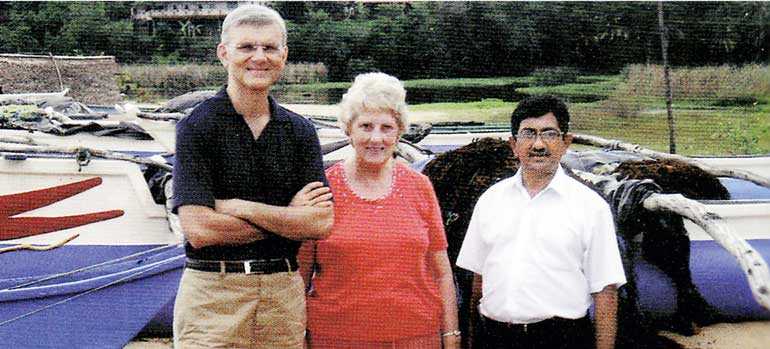
Razeen (left) with his mother and Nihal at Kalametiya beach, November 2011
By Chandani Kirinde
A day in early December 1977 is well etched in Razeen Sally’s memory. He was visiting the family’s estate bungalow named Razeena in Badulla and though only 12 years old at the time, there was foreboding that his carefree days spent with family and friends amidst the lush green tea bushes and bathing under waterfalls was coming to an end. There was in him a self-realisation he would not be back for some time. 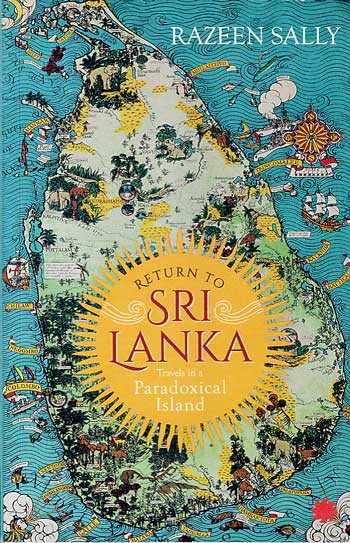
So, what did he do? He scribbled something on a piece of paper – something to the effect of “I will be back” – and buried it next to the lemon tree in the garden. A few weeks later he left the island with his family for the UK. “That was the end of my Sri Lankan childhood,” writes Sally in his recently released book ‘Return to Sri Lanka – Travels in a Paradoxical Island’.
Through the book is essentially a travelogue, for Sally it is also a very personal tale containing memories of his early childhood spent in Sri Lanka, of family traditions and squabbles , the complex relationship he shared with his father but into which he has woven in the country’s history for more than 2,500 years in a manner that a reader not only learns about the author’s life but also how one’s relationship with one’s land of birth can be as complicated as any human relationship, and more so if one is of mixed parentage.
Through the book is essentially a travelogue, for Razeen Sally it is also a very personal tale containing memories of his early childhood spent in Sri Lanka, of family traditions and squabbles , of the complex relationship he shared with his father but into which he has woven in the country’s history for more than 2,500 years in a manner that a reader not only learns about the author’s life but also how one’s relationship with one’s land of birth can be as complicated as any human relationship, and more so if one is of mixed parentage
Sally was born to an Anglo-Welsh mother and a Ceylonese-Muslim father and from early on he knew he was different. ”I had a British mother. I was different from my cousins. I was also always less of an insider, more of an outsider,” Sally recalls.
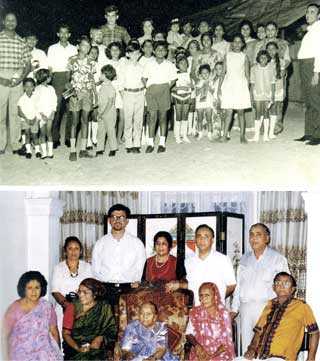 |
| Top: The Sally/Salih extended family and friends at Razeen's brother Reyaz's fourth birthday party, Mount Lavinia beach, September 1972 Bottom: Razeen's grandmother, father, his siblings at Razeen's 27th birthday party, Colombo, January 1992 |
His parents met on a ship named Orion in May 1955. She was bound for Australia from her home in North Welsh looking to start a new life in a distant land and on board she met a group of Ceylonese Air Force cadets returning home after training in Britain. Among them was fresh faced 19-year-old young man named Farouk Sally. The brief meeting led to six years of correspondence while she travelled in Australia and New Zealand and he in Colombo and culminated in their marriage in 1961.
Razeen was born on 27 January 1965 and the first five years of his life were spent in their family home in Ratmalana and in 1970 the family moved to a bigger house in the same neighbourhood. By then his father had left the Air Force and was well employed in a private company. In 1969, his uncle Razeen, after whom the author is named, bought Mount Lavinia Hotel and his father became its Managing Director.
It was good going for a while for the Sally family but with the change in government in 1970 which brought Sirimavo Bandaranaike back to power, Razeen’s family like many other families in the country were caught up in the vicissitude of fortune brought on by political change.
Their world crashed one night in 1971 when police raided their home and took away Razeen’s father to the Criminal Investigation Department (CID) for having violated the strict foreign exchange control law that Bandaranaike’s Government had put in place. It was the beginning of six trying years during which period the family faced many trials and tribulations. For six-year-old Razeen it was also the awakening of his political consciousness.
His parents met on a ship named Orion in May 1955. She was bound for Australia from her home in North Welsh looking to start a new life in a distant land and on board she met a group of Ceylonese Air Force cadets returning home after training in Britain. Among them was fresh faced 19-year-old young man named Farouk Sally. The brief meeting led to six years of correspondence while she traveled in Australia and New Zealand and he in Colombo and culminated in their marriage in 1961
“I had grown up from that young age with all the adults around me talking politics and particularly during the 1970s things got even more politicised. That period also got me obsessive to find out, not only what was happening in Sri Lanka but also the world,” Razeen says.
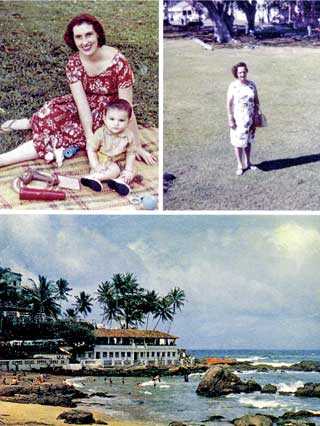 |
| Top left: Razeen with mother in the garden at the Hindu College Square, house, Ratmalana, 1966, Top right: Razeen's grandmother in front of the New Oriental Hotel, Galle Fort, 1969 |
When he went to UK in 1977, he was surprised to find no one there was interested in politics and some children did not even know the name of the prime minister. “Some children thought I was some kind of freak I was interested in finding out who the prime minister of this country was or who the president of that country was.”
However, before the move to the UK, the Sally family continued to be at the receiving end of newly-imposed Government laws with Razeen’s father being found guilty of foreign exchange law violations and being imprisoned. He and his brother were moved out of the school and home-schooled by their mother fearing they would be victimised for having their father in jail. Monthly visits to Welikada prison to see his father became part of their growing up years.
The July 1977 general election could not have come sooner for the Sally family. “It was a watershed year from the Sally family,” he says. The UNP led by J.R. Jayawardene won a five-sixth majority in Parliament and one of the new Government’s first acts was to pardon those convicted for foreign exchange violations.
Their world crashed one night in 1971 when police raided their home and took away Razeen’s father to the Criminal Investigation Department (CID) for having violated the strict foreign exchange control law that Mrs. Bandaranaike’s government had put in place. It was the beginning of six trying years during which period the family faced many trials and tribulations. For six-year-old Razeen it was also the awakening of his political consciousness
With the legal battles behind them, that December the family left for the UK and Sri Lanka soon began to fade in Razeen’s existence. “I did not realise it then, but I was saying goodbye to the land of my childhood for the next quarter century.”
In the intervening years, Sri Lanka became a “bothersome backwater” in Razeen’s mind and he became more judgmental about Sri Lanka as he rode up the ‘escalator of Western education’. His infrequent visits back to the country, once every four or five years did little to rekindle is love for the land of his birth and were made worse by being in “Daddy’s shadow, trailing him from one interminable business meeting and family visit to another”.
In Razeen’s book he takes a look at his relationship with his father who passed away in 2002. He doesn’t call it a troubled relationship as “we rarely had a big argument,” but it wasn’t an easy one either.
“One characteristic my two brothers have got from my mother is being very private, self-contained and not displaying our emotions in public which means not having arguments with each other. That is very British. Father was very different, very Sri Lankan in his characteristics. Open, emotional, unpredictable sometime maddening completely different from my mother.”
Razeen continues to have unresolved emotions where his relationship with his father is concerned but on his return of Sri Lanka in 2006, the first time since his father’s demise, he felt
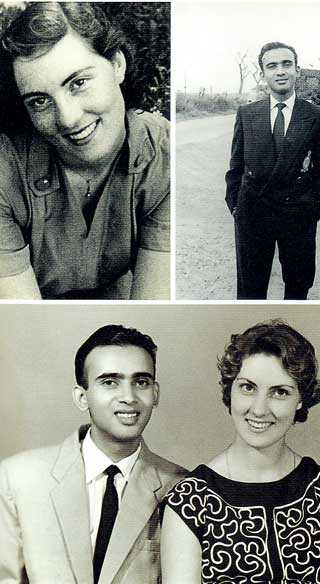 |
| Top left: Razeen's mother in Wales just before leaving for Australia 1955 Top right: Razeen's father in the UK for air force training, 1959 Bottom: Razeen's parents' wedding photo, Colombo |
free.
In the intervening years, Sri Lanka became a “bothersome backwater’ in Razeen’s mind and he became more judgmental about Sri Lanka as he rode up the ‘escalator of western education”. His infrequent visits back to the country, once every four or five years did little to rekindle is love for the land of his birth and were made worse by being in “Daddy’s shadow , trailing him from one interminable business meeting and family visit to another .”
“And So I came to stand, just before Christmas 2006, at a bedroom window at Galle Face Hotel, looking towards the Indian Ocean through sheets or wind and rain , covered by a low -slung canopy of dark, brooding clouds. I was free now. Daddy was not in the room next door. I did not have to follow him around Colombo all day; nor did I have to go outstation on trips he so meticulously organized. I was free to conjure up Sri Lanka in my imagination, uninhibited, and roam and discover my Sri Lanka, tangibly, at will,” he writes. “I did not have to follow him around Colombo all day; nor did I have to go outstation on trips he so meticulously organised. I was free to conjure up Sri Lanka in my imagination, uninhibited, and roam and discover my Sri Lanka, tangibly, at will.”
It was around the time that Razeen decided to travel the length and breadth of the land of his birth and write on his travels, “as a serious traveller, not as a tourist”.
I came to stand, just before Christmas 2006, at a bedroom window at Galle Face Hotel, looking towards the Indian Ocean through sheets or wind and rain , covered by a low -slung canopy of dark, brooding clouds. I was free now. Daddy was not in the room next door. I did not have to follow him around Colombo all day; nor did I have to go outstation on trips he so meticulously organized. I was free to conjure up Sri Lanka in my imagination, uninhibited, and roam and discover my Sri Lanka, tangibly, at will,” he writes
His travels began in 2009 starting from the South of the country, and since then, with his two regular drivers Joseph and Nihal, has crisscrossed the country taking in sights and sounds of the island, often diverting off the beaten track.
Along with many new discoveries about the country, for Razeen it has also been a journey of self-discovery and an awakening of the spiritual side in him. Although bought up as a conventional Muslim, and having had a brief mid-teen religious phase, Razeen had lived for 35 years having lost his faith in religion and God. Instead he had become the “conventional Western sceptic, agnostic and borderline atheist”.
But this began to change once he started coming back to Sri Lanka. A health problem led him to Ayurveda and then he took up basic meditation. In Singapore, where he had taken up residence since 2012, he got meditation instructions from Ven. Dhammika, an Australian monk and during their long discussions on Sri Lanka and state of Buddhism here, he learnt more about the spiritual aspects of the Buddha’s teachings and “came to find Buddhism’s spiritual core increasingly compelling”.
Along with many new discoveries about the country, for Razeen it has also been a journey of self-discovery and an awakening of the spiritual side in him. Although bought up as a conventional Muslim, and having had a brief mid teen religious phase, Razeen had lived for 35 years having lost his faith in religion and God. Instead he had become the “conventional Western skeptic, agnostic and borderline atheist.”
For Razeen, it’s not the end of his travels in Sri Lanka. “There is a large amount of Sri Lanka to be discovered. I would easily spend the rest of my life discovering more because I can’t think of another country of equivalent size which has such variety,” he says.
It has taken Razeen 10 years of travel across the island to discover both the land and its people while also discovering himself. And for the first time since he was a teenager, Sri Lanka feels more like “home” than anywhere else.
(Razeen Sally was born in Sri Lanka. He grew up in Colombo and completed his later schooling and university studies in the UK. He taught for many years at the London School of Economics and then at the Lee Kuan Yew School of Public Policy, National University of Singapore, where he still teaches.)
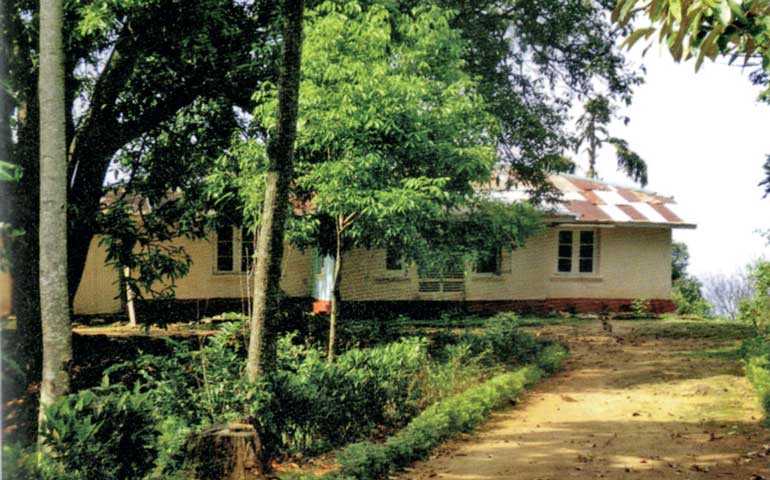
The Razeena estate bungalow, Uva, December 2014